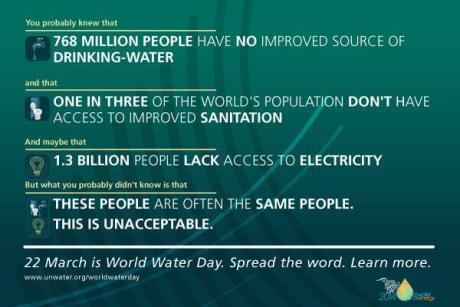World Water Day 2014
21/3/14
By 2030 it is predicted that we will need 35% more food, 40% more water and 50% more energy.
Many of us take water and energy for granted. Yet the stormy weather of this winter which resulted in water and power cuts made us realise what life must be like for the many millions for whom life without water and electricity is a daily challenge.
Each year more than 3.4 million people die from water, sanitation and hygiene-related causes. 99% of these deaths occur in the developing world. 1. 3 billion people do not have access to electricity. This Saturday, March 22nd marks world water day, and is an opportunity to look at the importance of water and energy in all our lives.
Access to clean drinking water and good sanitation facilities, nutritious food and modern energy services makes a huge difference to people’s health and wellbeing. Diseases such as diarrhoea and worms, which result from inadequate access to clean drinking water and sanitation facilities, are one of the largest causes of malnutrition in children under five. We recognise that there are simple, cost effective approaches to combating these preventable illnesses and deaths. Working with households on hygiene education, potable water information, and sanitation advice are all cost effective ways of having a significant impact on malnutrition, hunger and mortality rates.
Water and energy are closely interconnected. For example, drought reduces energy production and lack of access to electricity reduces irrigation options. Water is key to sustainable development in all sectors from agriculture to energy to industry. Water usage for agriculture accounts for about 70% and energy production about 22%. Irish Aid also focuses on managing water resources as a way of increasing access to water. By introducing more sustainable irrigation practices in agriculture and using seeds that need less water, the amount of water needed for agriculture can be reduced.
Improving access to water and sanitation, to nutritious food and modern energy systems are central to human development Demand for water is increasing due to changing patterns of consumption and production economic growth and changes in population, among others. By 2030 it is predicated that we will need 35% more food, 40% more water and 50% more energy.
World Water Day is an opportunity to raise awareness and increase understanding of the interdependencies across the water, energy and food sectors and to take action from the perspective of being interlinked in order to meet increasing global demands in a sustainable way.
Related videos on the links between food,water and energy
This video is an animation about the nexus of food, water and energy.
Our partners at the IIEA also explain the food, water and energy nexus.

